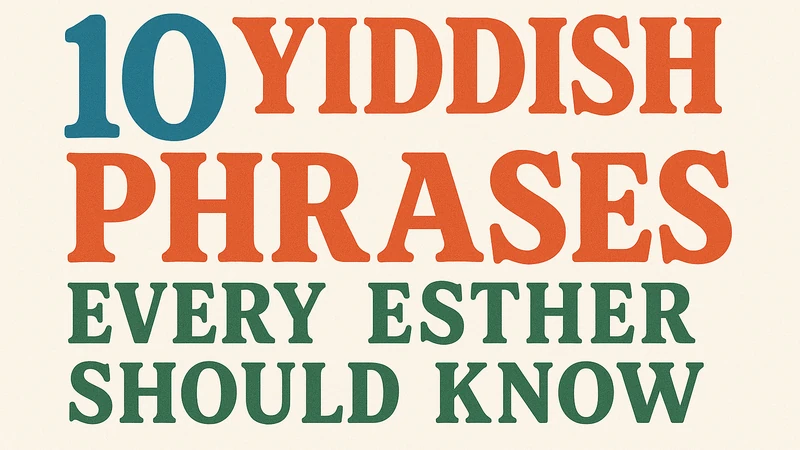Thousands gathered this fall in Weimar, Germany — a city once steeped in Nazi propaganda — to celebrate something Hitler’s regime tried to erase: Yiddish, the musical, resilient heart language of European Jewry.
As reporter Jastinder Khera writes for The Times of Israel, the Yiddish Summer Weimar Festival drew visitors from every corner of the world to sing, dance, and revive a culture nearly silenced by the Holocaust. Cabaret performances, circus acrobatics, and klezmer concerts filled the city squares with laughter and light. Musicians even introduced “psychedelic Yiddish rock,” proving that the thousand-year-old tongue still has rhythm — and chutzpah.
Festival director Alan Bern reminded the crowd, “We are standing on a square where fascism was once celebrated. Here we are — and, until now, they’re not here!” The audience erupted in applause. Later, teacher Jana Wagner called the gathering “food for the soul.” Families joined hands in a circle dance, joy rising where hatred once ruled.
Before World War II, more than ten million Jews spoke Yiddish. The Holocaust silenced millions of those voices, but the language survived — carried in prayers, lullabies, and songs that crossed oceans with refugees. Today, UNESCO classifies Yiddish as endangered, yet its humor and heart live on in words like chutzpah, schlep, and kvetch. Poet Jake Schneider, part of Berlin’s modern Yiddish scene, said the revival must avoid nostalgia: “It was absolutely essential to go to Berlin if you wanted to see and be seen.” Now, he says, the goal is not to look back, but to create forward.
Across the Atlantic, Yiddish found a second home in America. From New York’s Lower East Side to early Hollywood soundstages, it flavored comedy, music, and everyday life. Writers like Neil Simon, filmmakers like Mel Brooks, and composers from Irving Berlin to Leonard Bernstein carried its rhythm into the American story. Today, Yiddish theatre still thrives at the National Yiddish Theatre Folksbiene, and in Brooklyn, ultra-Orthodox families speak it daily, teaching it to their children as naturally as breathing.
For Christian Women For Israel, this revival is more than cultural curiosity — it’s a living testimony to God’s faithfulness. A language nearly erased by evil is being sung again in public squares, the same places that once echoed with hate. Psalm 119:50 says, “My comfort in my suffering is this: Your promise preserves my life.” That verse could well be the anthem of this revival — proof that God’s promises are stronger than history’s attempts to silence His people.
There’s a Yiddish phrase that captures this hope perfectly: “Zol zayn mit mazel.”
It means “May it be with blessing.”
That’s what we pray over Israel, over every survivor who still sings, and over every word of Yiddish that once trembled on the edge of extinction. A language the world tried to erase now rises again in song and laughter. May it all be with blessing.
Am Yisrael Chai — The People of Israel Live.
10 Yiddish Phrases Every Esther Should Know
Yiddish isn’t just a language — it’s a heartbeat. These phrases carry the humor, warmth, and courage of the Jewish people.
- Oy vey (oy VAY) – “Oh woe!” The universal sigh for life’s challenges.
- Chutzpah (KHOOT-spah) – Boldness and nerve — the kind of courage Esther had.
- Mensch (mench) – A person of integrity and kindness.
- Kvell (kvel) – To beam with pride, usually over someone you love.
- Naches (NAH-khes) – The deep joy or pride a parent feels in a child’s goodness.
- Zei gezunt (zay guh-ZOONT) – “Be healthy.” The sweetest blessing in everyday life.
- Zol zayn mit mazel (zohl zine mit MAH-zl) – “May it be with blessing.” A wish for success, joy, or peace.
- Bubbe meise (BOO-beh MY-seh) – Literally “grandmother’s tale,” meaning an old wives’ story.
- Nu (noo) – “Well?” “So?” or “Come on!” — depending on the tone!
- Farbissenah (far-BISS-en-uh) – A sourpuss or grouch — the opposite of a joyful Esther!
As Tevye might say from Fiddler on the Roof, “Nu? Life is full of tsuris (trouble) — but thank God we can still dance!”
Adapted from “Food for the Soul: Germany pushes to revive an endangered language – Yiddish” by Jastinder Khera, The Times of Israel, October 23, 2025*
Read the original article: Times of Israel



